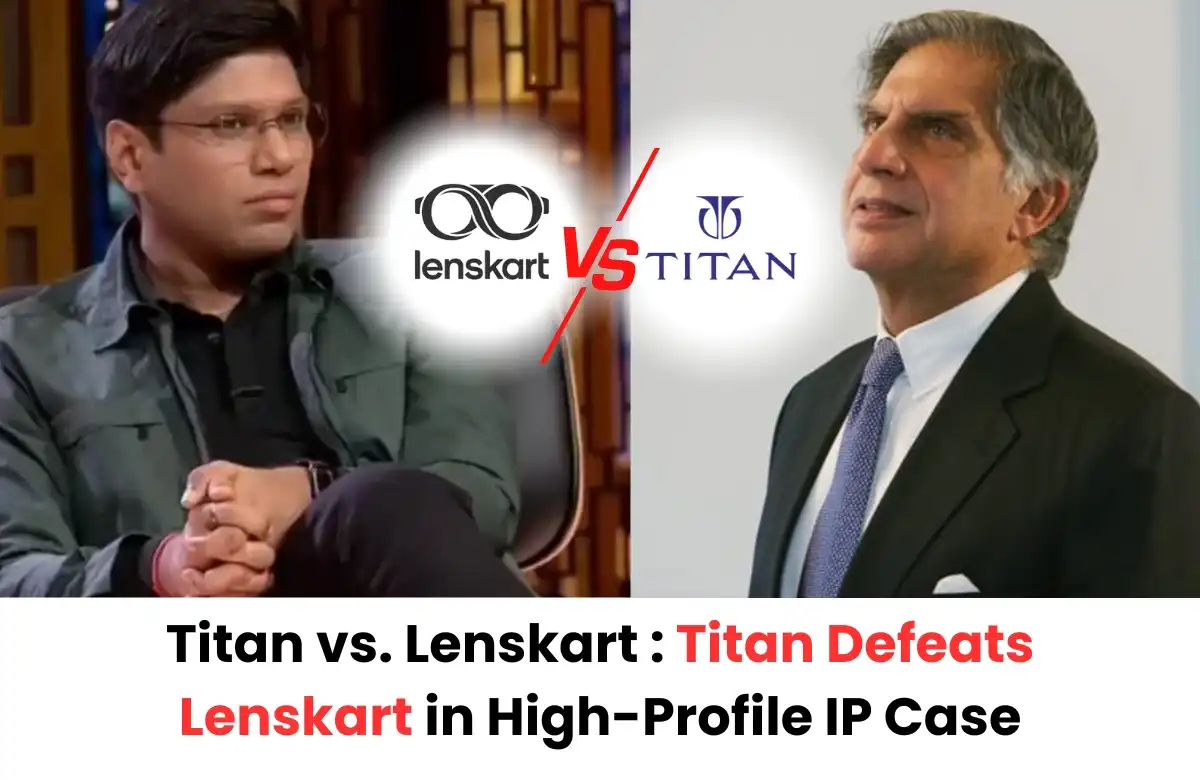
A high-profile case in the Delhi High Court has recently made headlines for its intriguing reasoning. The court ruled in favor of Titan Company Limited in the matter of Titan vs. Lenskart, where Titan filed a lawsuit against Lenskart for trademark infringement. The judgment highlights the court’s firm stance on protecting intellectual property rights, especially in the digital space. But this case is a perfect example of how serious IPR is in India, and even the smallest infringement will not be taken lightly.
Why Titan Took Lenskart to Court: A Trademark Conflict Uncovered
The case began when Titan Company Limited noticed something unusual—their trademarked name “Titan” was appearing on Lenskart’s website without permission. The infringement wasn’t limited to what customers could visibly see on the site—Titan also noticed that Lenskart was using their brand names in the backend of the website, specifically in the meta descriptions (part of the website’s HTML code that helps search engines understand and rank the page). This use of hidden branding could mislead search engines and consumers, making it appear as though Lenskart was associated with or offering genuine Titan products.
Titan Company Limited served a formal notice to Lenskart on 13 February 2025, objecting to the unauthorized use of its trademarks, including “Titan” and “Fastrack,” on Lenskart’s online platform.
As the matter was not resolved, Titan proceeded to initiate a commercial lawsuit (CS(COMM) 589/2025) in the Delhi High Court on 30 May 2025. Remarkably, the Court delivered its ruling on the same day, siding with Titan. The Court acknowledged that Lenskart had violated Titan’s trademark rights—both through visible branding and hidden use in the website’s meta tags—and issued a decree based on Lenskart’s acknowledgment of the issue and willingness to comply.
Read Also:-Delhi High Court Blocks Kuku FM in Pocket FM vs Kuku FM Copyright Case
Why Meta Tags Mattered in Titan’s Trademark Battle with Lenskart
These tags are not visible to regular visitors but help in determining how the page should be indexed. One type of meta tag is the meta keyword tag, where website owners may insert search-friendly terms like <meta name=”keywords” content=”Titan watches, Fastrack eyewear”> to improve visibility on search engines. Another important tag is the meta description, which provides a brief summary of the webpage’s content and often appears below the page title in search results. For example: <meta name=”description” content=”Shop Titan watches and Fastrack eyewear online at Lenskart.”>. In the Titan vs. Lenskart case, Titan alleged that Lenskart used Titan’s name in the Lenskart website’s meta description. This kind of hidden use can mislead search engines and users by falsely suggesting an association with the brand, which constitutes trademark infringement even if the names don’t appear visibly on the page.
What Did the Court Rule Against Lenskart in the Titan Case?
The Delhi High Court gave the final decision of judgment on 30 May 2025. And gave a few orders for Lenskart.
Lenskart accepted the allegations. They quickly removed all the infringement elements, like the brand name and meta tags. And also promised that they will not do such activities again in the future. And because of this, the court gave the decision on the same date. Also, because the case was settled so quickly, Titan didn’t have to pay any court fees.
Conclusion
The Titan vs. Lenskart case is very important and has set an example for the whole business that even the smallest infringement will not be overlooked. The instant judgment by the Delhi High Court reinforces that unauthorized use of brand names, whether visible or hidden, can lead to legal action and consequences.
Read Also:-Kolkata School Students Invent Low-Cost Lightning Conductor, File for Patent
